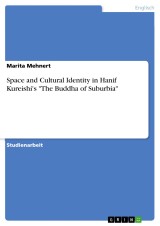Details

Space and Cultural Identity in Hanif Kureishi's "The Buddha of Suburbia"
1. Auflage
|
13,99 € |
|
| Verlag: | Grin Verlag |
| Format: | |
| Veröffentl.: | 09.04.2021 |
| ISBN/EAN: | 9783346384065 |
| Sprache: | deutsch |
| Anzahl Seiten: | 12 |
Dieses eBook erhalten Sie ohne Kopierschutz.
Beschreibungen
Studienarbeit aus dem Jahr 2019 im Fachbereich Anglistik - Literatur, Note: 1,3, Universität Bielefeld, Sprache: Deutsch, Abstract: This term paper uses a postcolonial approach to analyse Karim's movement between the city centre and the suburbs in "The Buddha of Suburbia". These spatial relations reflect on his development of a culturally hybrid identity that goes beyond the simple British-Indian dichotomy. It moves on from a binary view of belonging either to the one or the other to a more differentiated understanding of the fluid, fragmentary and hybrid nature of the protagonist’s postcolonial identity.
The novel follows the journey of the protagonist, Karim, as he navigates through different spaces in London, ranging from the suburbs, the home of his biracial family, to the inner city. All while grappling with his quest for a 'true' identity. Set in the 1970s, just after the post-World War II influx of immigrants from former British colonies. The narrative is shaped by the socio-political backdrop of the time, marked by the Commonwealth Immigrants Acts of 1962 and 1968, which restricted the entry of Commonwealth citizens.
The spatial relations in the novel mirror a center-periphery dynamic akin to colonial British-Indian relations. The suburbs symbolize the diaspora and marginalized regions and populations, while inner London represents the epitome of power, wealth, and social and cultural achievements. Karim's movement between these spaces parallels his cultural identity's evolution, transcending the simplistic British-Indian dichotomy. The narrative progresses beyond a binary view of belonging to either one culture or the other, illustrating a more nuanced understanding of the fluid, fragmentary, and hybrid nature of the protagonist’s postcolonial identity.
Informed by Stuart Hall's cultural studies, the novel rejects the concept of distinct, complete, and coherent identities. Instead, identity is portrayed as fluid, a work in progress marked by fragmentation and defined by differences from other identities. These differences are shaped by the characteristic binaries of dominant and subordinate identities, reflecting the complexities of Karim's journey towards a multifaceted and evolving sense of self.
The novel follows the journey of the protagonist, Karim, as he navigates through different spaces in London, ranging from the suburbs, the home of his biracial family, to the inner city. All while grappling with his quest for a 'true' identity. Set in the 1970s, just after the post-World War II influx of immigrants from former British colonies. The narrative is shaped by the socio-political backdrop of the time, marked by the Commonwealth Immigrants Acts of 1962 and 1968, which restricted the entry of Commonwealth citizens.
The spatial relations in the novel mirror a center-periphery dynamic akin to colonial British-Indian relations. The suburbs symbolize the diaspora and marginalized regions and populations, while inner London represents the epitome of power, wealth, and social and cultural achievements. Karim's movement between these spaces parallels his cultural identity's evolution, transcending the simplistic British-Indian dichotomy. The narrative progresses beyond a binary view of belonging to either one culture or the other, illustrating a more nuanced understanding of the fluid, fragmentary, and hybrid nature of the protagonist’s postcolonial identity.
Informed by Stuart Hall's cultural studies, the novel rejects the concept of distinct, complete, and coherent identities. Instead, identity is portrayed as fluid, a work in progress marked by fragmentation and defined by differences from other identities. These differences are shaped by the characteristic binaries of dominant and subordinate identities, reflecting the complexities of Karim's journey towards a multifaceted and evolving sense of self.

















